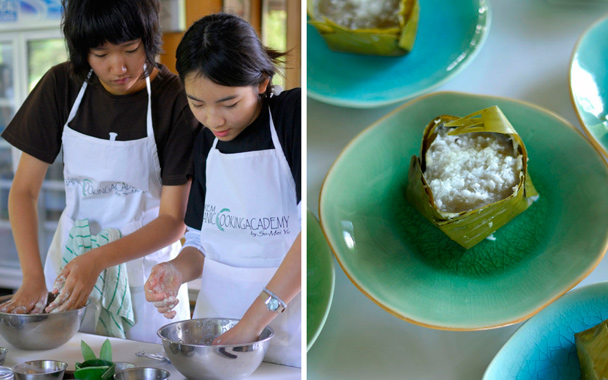When you get right down to it, Asian kids aren’t all that different from American kids, especially in the kitchen. They’re easily bored and largely afraid of anything unfamiliar or green. “Most Thai food is based on vegetables, which is really tough on kids,” says Joy Huss, administrator of the year-old Prem Organic Cooking Academy just outside of Chiang Mai, which attracts international students from all over the world. “They’re quite spoiled and they’ll complain at first: ‘Oh, why do we have to wash dishes?’”
The answer lies with the academy’s senior adviser, Su-Mei Yu, who is on a mission to preserve age-old Thai kitchen habits (and won an award for her efforts from Project Concern in November 2008). “I wanted to do something a little bit different from all the other cooking schools,” she says. “The main focus here is on teaching kids about food and where it comes from and that we are part of nature. If we don’t take care of nature, we can’t take care of ourselves.”
Prem students make everything from scratch, with ingredients derived only from nature. “They have to make their own coconut milk,” Huss says. “Every class has a different meal. It all depends on the season and what’s at the farm.”
The farm encompasses four acres of organic lands adjacent to the academy, where kids learn everything from growing vegetables to making wood vinegar for use as a natural pesticide. Farm coordinator Sheena Jackson takes students on culinary tours among rows of tomatoes and melons, beneath overarching tentacles of squash, past ponds lined with pandanus. “There’s a whole world of things growing out here,” she says.
(Creatures, too—rabbits, boars, birds, cows, goats, and buffalo. “Our goats are great sources of manure,” Jackson says. “And that praying mantis clinging to the ivy gourd? Just finding stuff like this is really great for kids.”)
Here, kids can get down to the nitty-gritty of jungle cooking. “They split the bamboo. They make the skewers. They wrap fish and vegetables in banana leaves and they grill them. They do all the fresh vegetables and herbs grilled on the fire, on skewers,” Huss says. (The class requires safety training in the use of fire and knives.)
Once they’ve mastered the machete, the dishes don’t seem so daunting—and the kitchen isn’t such a boring place after all.




 Pinterest
Pinterest


